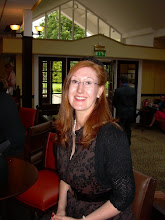 ed, as the Times reviewer points out, is the "muckiness" – Hardy’s gory scene when the Durbeyfield horse is killed, for example. And what was with the fog during the rape scene? It did cover up things the BBC might prefer not to portray, but I was expecting aliens to emerge from the X-Files mist at any moment.
ed, as the Times reviewer points out, is the "muckiness" – Hardy’s gory scene when the Durbeyfield horse is killed, for example. And what was with the fog during the rape scene? It did cover up things the BBC might prefer not to portray, but I was expecting aliens to emerge from the X-Files mist at any moment.My problem with it, I think, is neatly summed up in an interesting review of Tess in the Times, "Fun, but is it Hardy?" The review mentions what critic David Thomson calls "the indecency of the visual", and that seems a brilliant way of putting it; books make good films/TV series, but what they make is films/TV series; the book gets lost no matter how closely they stick to the plot. What they can’t do is genuinely recreate the spirit of the book, and somehow the visualisation loses the nuances and makes it "indecent" – not necessarily in a sexual sense, though sometimes that too, but in a slightly mis-translated way. It’s the old chestnut about "the book is better than the film" – well, nearly always yes, but the film isn’t the book, and serves a different purpose (Sunday evening viewing for the middle-classes, usually). Sadly, some of us (ie those who work with Victorian literature – or me, at least) can’t just be entertained, and just watch crossly as the clunky references to class distinction, gender differences and a bucolic past are swept across the screen for the uncritical viewer. I wish I could just relax and enjoy it.











No comments:
Post a Comment